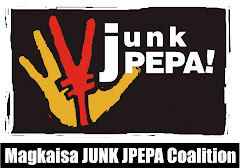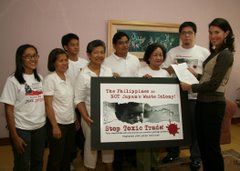20 April 2008, Quezon City. The controversial Japan-Philippines Economic Partnership Agreement (JPEPA) has attracted criticism and resistance not only among Filipinos, but also from Japanese as the Senate vote for the treaty nears.
In two separate petitions sent to the Senators of the 14th Congress, concerned Japanese citizens and citizens’ groups made a passionate plea for the rejection of the treaty, asserting that “the Philippines deserves a better and just deal from Japan.”
“JPEPA would establish a relationship between the Philippines and Japan that is completely opposite to our wish for equality and mutual respect between good-neighbors,” they said, warning further that “JPEPA can even become a barrier in the long-term friendship between the two countries.”
The Japanese petitioners lauded the Magkaisa Junk JPEPA Coalition (MJJC) and other groups for putting up a strong opposition to JPEPA, saying that “they were right in condemning the secretive negotiations which did not benefit from informed public participation and for disclosing the bad effects of JPEPA to the economy, the environment and to Philippine sovereignty.”
The first letter was signed by over 90 individuals and 25 groups and transmitted to the Senators through the Kilusan para sa Pambansang Demokrasya (KPD), a member of the MJJC.
In his cover letter, Pete Pinlac, KPD Chair, told the senators that the Japanese took it upon themselves to express their misgiving about the “unequal” treaty, which the signatories denounce for its “inherent bias for the Japanese economy” to the detriment of genuine development, social justice and environmental integrity for the Filipinos.
“We believe that you, our elected Senators, possess enough good sense to recognize what is good for the many and not just for a few, and hope that you take to heart the points raised by our Japanese counterparts,” Pinlac said.
Echoing local opposition to contentious trade and economic pact, the Japanese opponents of JPEPA pointed out that the treaty will hurt Filipino companies, while providing advantages to Japanese business, in addition to the “possible export (of) Japanese pollution and waste to the Philippines.”
“The potential for job creation for the Philippine people under JPEPA, as argued by the Japanese and Philippine governments, will in reality be extremely small compared to the jobs lost as a result of the destruction of Philippine industry and agriculture caused by the JPEPA,” they emphasized.
The second letter was e-mailed directly to the Senators from Tokyo and signed by 24 groups.
“As Japanese grassroots groups working on agriculture, environment, public health, human rights, trade and consumer issues, we fear about the dire consequences if JPEPA is ratified, which lists toxic wastes, persistent organic pollutants, ozone depleting substances, among others, as "products" under JPEPA,” the second letter reads. “From our view, JPEPA will facilitate the practice of sending Japanese toxic wastes and other harmful substances into the Philippines in the name of free trade.”
“Since November 2006, we have released a number of statements urging the Japanese government to remove all provisions in JPEPA that liberalize trade in toxic wastes and other banned or controlled substances, but to no avail,” the groups lamented.
The Japanese petitioners asked the Senators to resist Japanese pressure to approve the “faulty agreement and to decide in favor of what is best for the Philippines.”
Subscribe to:
Post Comments (Atom)






No comments:
Post a Comment